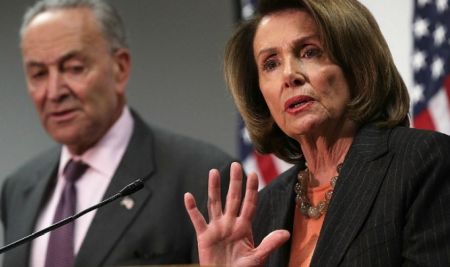WASHINGTON, D.C. (Texas Insider Report) — As Democrat House Speaker Nancy Pelosi admitted earlier this week that she'd intentionally delayed consideration of a COVID-19 Relief Bill until after the November 3rd Election in order to hinder President Donald Trump's re-election chances, even year-end deadlines, collapsing small business and a record-breaking high of 3,000 daily COVID deaths across the U.S. haven’t been sufficient to drive Washington Democrats to a CoronaVirus Relieve Package agreement – despite hospitals straining at capacity from soaring caseloads nationwide.
 The $900 billion potential COVID-19 Aid Package from a bi-partisan group of lawmakers collapsed Thursday after Senate Majority Leader Mitch McConnell (right,) said Republican Senators would not accept the Democrat's demands to include $160 billion in bailout funding for State & Local governments as part of the deal.
The $900 billion potential COVID-19 Aid Package from a bi-partisan group of lawmakers collapsed Thursday after Senate Majority Leader Mitch McConnell (right,) said Republican Senators would not accept the Democrat's demands to include $160 billion in bailout funding for State & Local governments as part of the deal.As a result, the GOP leader said there is no path forward on the slimmed-down version of the Republican-initiated CoronaVirus "liability shield" for companies and organizations facing potential lawsuits because of COVID-19.
The GOP leader criticized the “controversial state bailouts” during a speech on the Senate Floor Thursday, as he insisted Americans are demanding a more targeted COVID-19 Aid Package.
The breakdown over the COVID aid package, after days of behind-the-scenes talks by a group of lawmakers fed up with inaction, comes as President Donald Trump sought to move the talks in another direction — insisting on a fresh round of $600 stimulus checks for Americans.
Sending direct cash payments to households was not included in the bipartisan proposal, but has been embraced by some of the president's fiercest critics – including Rep. Alexandria Ocasio-Cortez (D-NY) and Sen. Bernie Sanders (Democrat-Socialist-VT) who introduced an amendment to include the checks with Trump ally Sen. Josh Hawley (R-MO).
Sanders said the unprecedented moment facing the nation with the pandemic and its economic fallout requires Congress to “take unprecedented action.”
 Trump's top negotiator on the COVID-19 Relief Bill, Treasury Secretary Steven Mnuchin, reported headway Thursday before the package from the bipartisan senators' group fell apart over Democrat's insistance to remove the "liability shield" – which Republicans say would only benefit one of the Democrat's chief funding sources, trial lawyers. “I think we’re making a lot of progress," Mnuchin said.
Trump's top negotiator on the COVID-19 Relief Bill, Treasury Secretary Steven Mnuchin, reported headway Thursday before the package from the bipartisan senators' group fell apart over Democrat's insistance to remove the "liability shield" – which Republicans say would only benefit one of the Democrat's chief funding sources, trial lawyers. “I think we’re making a lot of progress," Mnuchin said.Legislators focus on a one-week stop-gap measure to prevent the shutdown of the federal government, which is set to expire Saturday evening at 11:59 p.m., appears to have sapped some urgency from the talks. The short-term government-wide funding bill, approved by the House on Wednesday, cleared the Senate early Friday afternoon.
The next deadline will be Dec. 18th, but both House and Senate leaders say they won’t adjourn without passing a COVID Relief measure.
The $900 billion-plus COVID-19 Relief Bill provides sweeping new funds for vaccines, small businesses, health care providers, schools and families suffering from the virus crisis and the economic shutdowns.
A key hold up has been the standoff over more money for the states – which Republican legislators say Democrats want in order for blue states to be able bail out their over-committed or potentially bankrupt pension systems.
Democrat leaders Pelosi and Senate Minority Leader Chuck Schumer (above left, D-NY,) had wanted far more in state and local bailout aid, but were accepting a lower figure of $160 billion.
 The Trump administration is back in the middle of the negotiations with a $916 billion plan. It would send a $600 direct payment to most Americans, but eliminates a $300-per-week employment benefit favored by the bipartisan group of Senate negotiators.
The Trump administration is back in the middle of the negotiations with a $916 billion plan. It would send a $600 direct payment to most Americans, but eliminates a $300-per-week employment benefit favored by the bipartisan group of Senate negotiators.The White House offer has the endorsement of the top House Republicans, but Democrats immediately blasted the plan.
It also includes a four-month extension of jobless benefits set to expire at the end of the month, $300 billion for “paycheck protection" subsidies for struggling businesses, funding for vaccines and testing, and a host of smaller items such as aid to various transit systems and health care providers.
























